Can a Gardener Clear Garden Waste?
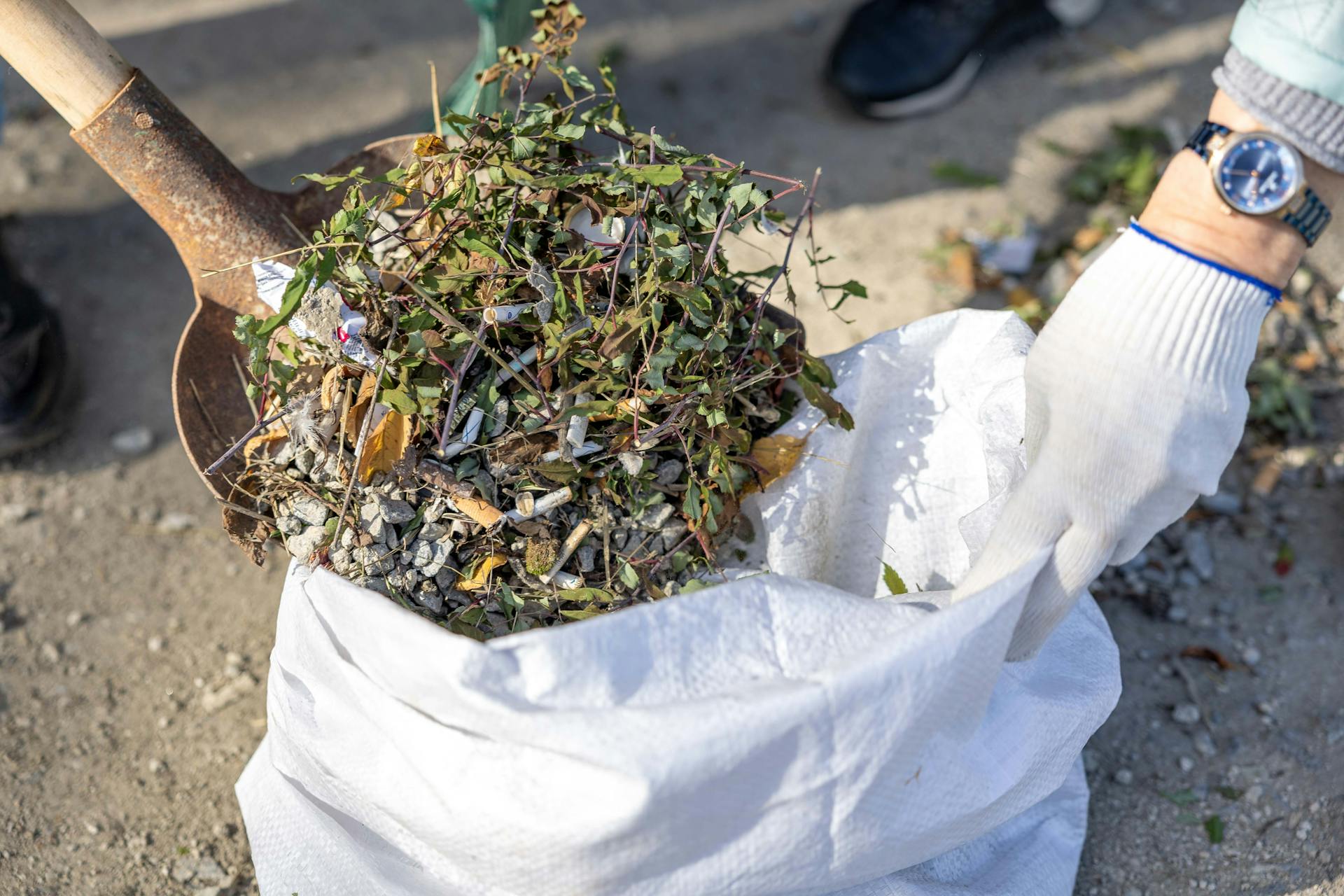
The easiest way to book quality trades
When your garden project generates mountains of green waste, fallen leaves, or pruned branches, the cleanup often feels more daunting than the actual gardening work. Many homeowners assume they'll need separate waste removal services after gardening is complete, but this creates additional coordination, costs, and delays that complicate straightforward garden maintenance projects.
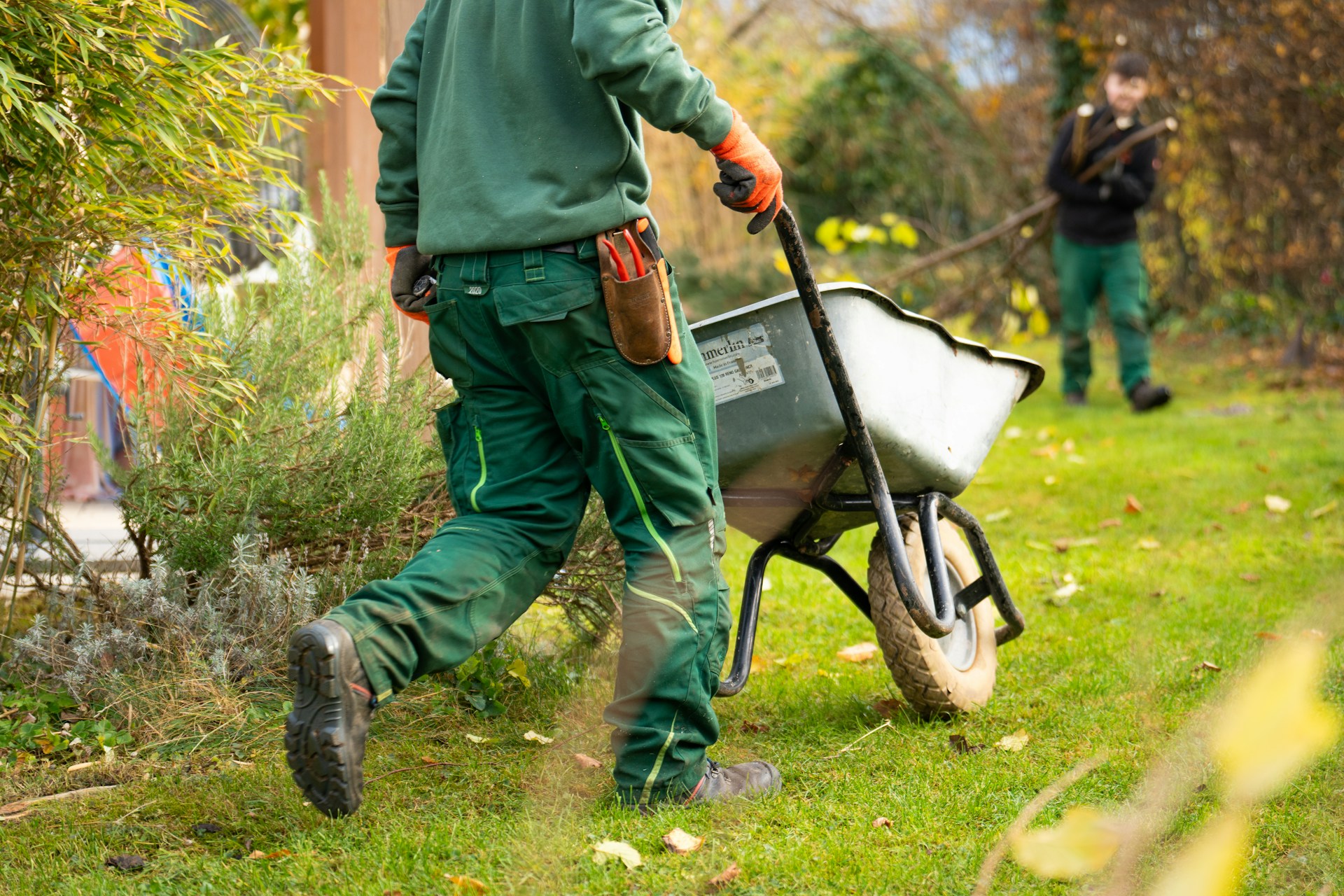
The answer is yes, most professional gardeners can and do clear garden waste as part of their standard services. However, the scope of waste clearance, pricing structure, and removal methods vary significantly between different gardening professionals, making it essential to understand what's included versus what requires additional arrangements.
Professional gardeners typically handle routine garden waste including grass clippings, hedge trimmings, pruned branches, fallen leaves, and general organic debris through integrated disposal services that cost £50-£150 extra per visit depending on waste volume and disposal method. However, large-scale clearance projects involving extensive tree removal, soil disposal, or construction debris often require specialized waste management services that standard gardening contracts don't cover.
Understanding exactly what gardeners can clear, how they dispose of different waste types, and realistic pricing for various clearance scenarios helps homeowners plan garden projects effectively while avoiding unexpected costs or coordination problems that disrupt project schedules and budgets.
What Garden Waste Can Professional Gardeners Clear?
Professional gardeners handle most organic garden waste as part of their standard service offering, but significant variations exist in what different contractors include in basic pricing versus additional charges for specialized disposal requirements.
Standard Organic Waste Clearance
Most professional gardeners routinely clear organic waste generated during regular maintenance activities without requiring separate waste management arrangements or specialized equipment beyond standard gardening tools and transport vehicles.
Routine Maintenance Waste
Grass clippings from regular mowing represent the most common garden waste type that professional gardeners handle seamlessly. Most experienced contractors include grass clipping removal in standard lawn care pricing, either through on-site composting recommendations or removal to appropriate disposal facilities.
Hedge and shrub trimmings from routine pruning activities typically fall within standard gardening service scope, with most contractors equipped to handle moderate volumes of organic pruning waste through integrated disposal arrangements that don't require additional coordination or pricing.
Seasonal Clearance Materials
Autumn leaf clearance represents seasonal waste management that most gardeners include in standard service offerings, understanding that leaf removal is essential for lawn health and garden appearance during transitional periods that affect overall garden maintenance quality.
Deadheading waste, annual plant removal, and general garden tidying debris typically integrate seamlessly into routine gardening services without requiring specialized disposal arrangements or significant additional costs beyond standard hourly rates.
Small Branch and Woody Material
Most professional gardeners can handle small to medium branch removal from routine pruning activities, typically processing branches up to 4-6 inches diameter through chipping, cutting for disposal, or removal to appropriate waste facilities that accept organic woody materials.
However, large branch removal, whole tree sections, or extensive woody waste from major pruning projects often exceeds standard gardening capabilities and may require specialized tree service contractors with appropriate equipment and waste disposal arrangements.
Specialized Waste Requiring Additional Services
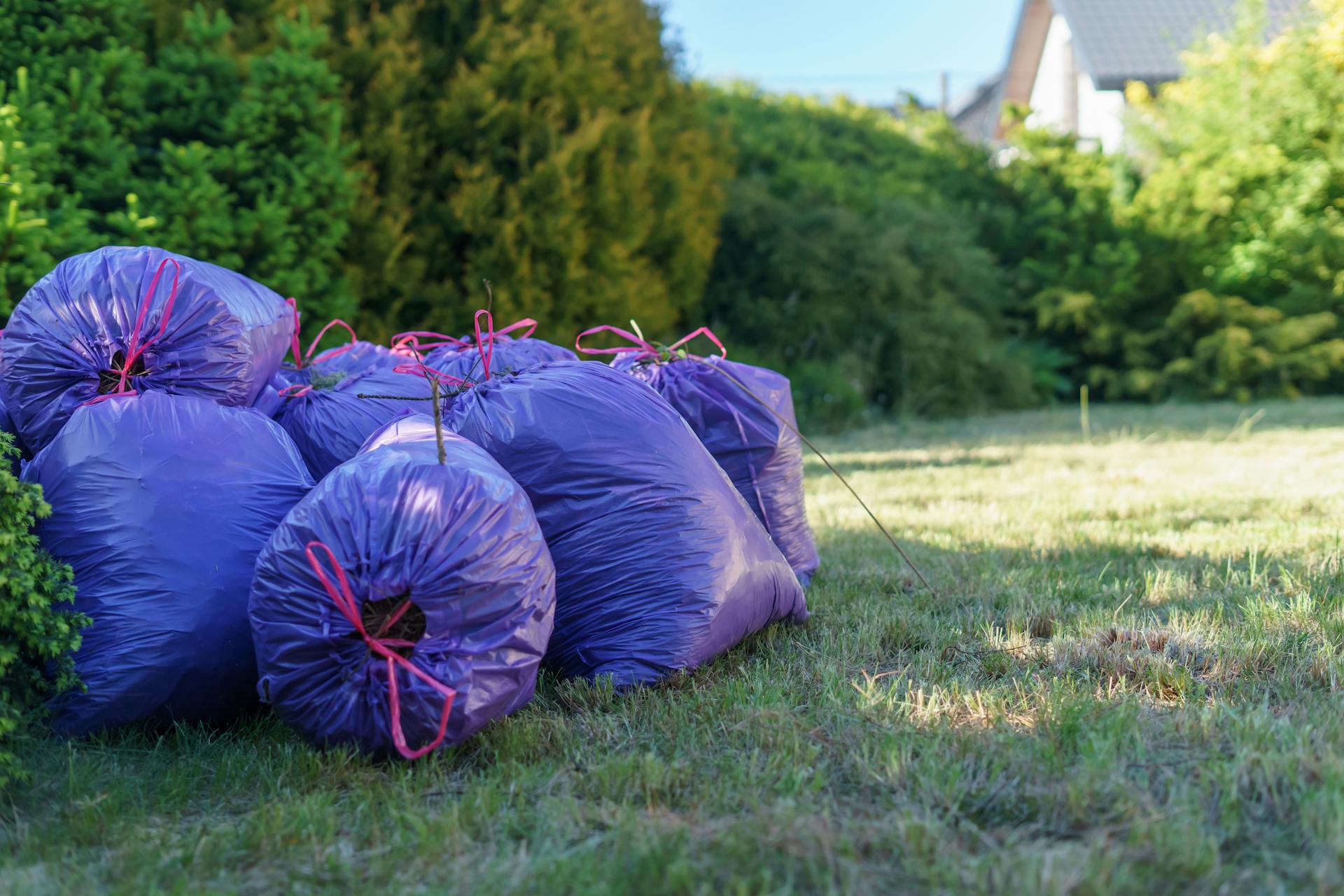
Certain waste types exceed standard gardening service capabilities and require specialized removal services, additional equipment, or alternative disposal arrangements that affect project pricing and coordination requirements.
Large Volume Clearance Projects
Overgrown garden clearance involving extensive vegetation removal, large shrub extraction, or comprehensive site clearance often generates waste volumes that exceed standard gardening vehicle capacity and require specialized transport arrangements or multiple removal trips that increase project costs significantly.
Garden renovation projects removing established landscaping features, mature plant materials, or extensive hardscaping elements create waste streams that require careful planning, appropriate disposal facilities, and specialized handling that standard gardening services may not accommodate within routine pricing structures.
Non-Organic Garden Materials
Soil removal, stone clearance, and hardscaping debris fall outside standard organic waste clearance capabilities and typically require specialized waste management services with appropriate licensing, transport capacity, and disposal facility arrangements that gardening contractors don't normally provide.
Old garden furniture, broken planters, irrigation system components, and manufactured garden materials require alternative disposal methods that standard organic waste management approaches cannot accommodate, necessitating separate coordination with appropriate waste removal specialists.
Need a gardening professional?
Get instant quotes from 3-5 vetted local tradespeople. Compare prices, reviews, and availability—all in one place.
How Gardeners Handle Waste Disposal
Professional gardeners employ various waste disposal methods depending on waste type, local regulations, disposal facility availability, and cost-effectiveness considerations that affect service pricing and environmental impact.
On-Site Waste Management Solutions
Many professional gardeners prefer on-site waste management approaches that reduce transport costs, provide environmental benefits, and create value-added services that enhance overall garden health and sustainability.
Composting and Mulching Programs
Professional gardeners often establish on-site composting systems that convert organic waste into valuable soil amendments, reducing disposal costs while providing long-term garden health benefits that justify integrated waste management approaches.
Chipping services convert woody pruning waste into valuable mulch materials that suppress weeds, conserve soil moisture, and improve garden appearance while eliminating disposal costs and creating sustainable waste management solutions that benefit overall garden health.
Integrated Garden Improvement
Some professional gardeners use garden waste strategically for habitat creation, erosion control, or soil improvement projects that eliminate disposal costs while enhancing garden functionality and environmental value through creative waste utilization approaches.
Commercial Waste Disposal Arrangements
Professional gardeners typically maintain relationships with commercial waste disposal services that accept organic garden waste, providing reliable disposal options that don't require homeowner coordination or additional service arrangements beyond standard gardening contracts.
Licensed Waste Carriers
Reputable professional gardeners hold appropriate waste carrier licenses enabling legal transport and disposal of garden waste through approved facilities that comply with environmental regulations and provide appropriate documentation for waste disposal compliance.
Green Waste Recycling Facilities
Most professional gardeners utilize specialized green waste recycling facilities that process organic materials into compost, mulch, or biomass fuel, providing environmentally responsible disposal options that support sustainable waste management practices.
Cost-Effective Disposal Networks
Experienced gardening contractors develop disposal networks that minimize transport costs and disposal fees through efficient route planning, bulk disposal arrangements, and facility relationships that provide competitive pricing for routine waste management requirements.
Garden Waste Clearance Pricing Structure
Understanding realistic pricing for garden waste clearance helps homeowners budget appropriately while recognizing the factors that affect disposal costs and service scope in different clearance scenarios. Use our gardener cost calculator to estimate waste clearance costs for your project.
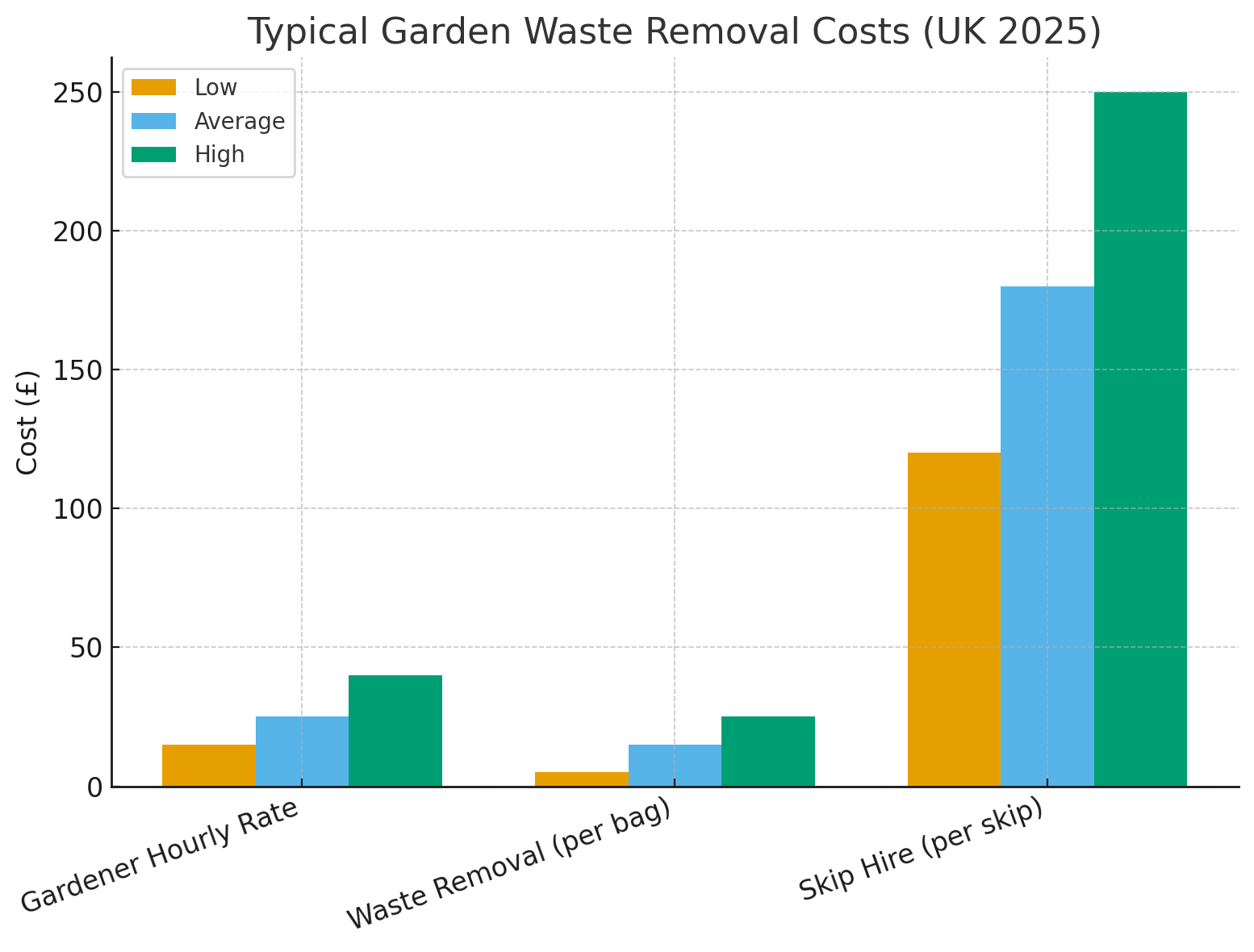
Standard Waste Clearance Costs
Routine Maintenance Waste
Most professional gardeners include basic waste clearance in standard hourly rates ranging from £25-£45 per hour, with routine organic waste disposal typically adding £20-£50 to standard maintenance visits depending on waste volume and disposal method.
Small load garden waste removal for routine maintenance typically costs £50-£100 additional charge, while larger volumes may require £100-£200 depending on transport requirements and disposal facility fees that affect overall project costs.
Seasonal Clearance Projects
Autumn leaf clearance and seasonal garden tidying typically cost £80-£150 for average residential gardens, including collection, removal, and appropriate disposal through commercial green waste facilities or municipal collection programs. Winter garden preparation often requires comprehensive waste clearance as part of seasonal maintenance planning.
Ready to hire a trusted gardening?
Compare quotes, read verified reviews, and hire with confidence. Our platform connects you with local professionals who are ready to help.
Instant Quotes
Responses within 24 hours
Verified Reviews
Real customer feedback
No Commitment
Choose when you're ready
Spring garden preparation involving winter debris clearance, dead plant removal, and general garden tidying typically ranges from £100-£250 depending on garden size, waste volume, and additional services required for comprehensive seasonal preparation.
Specialized Clearance Pricing
Large Volume Projects
Extensive garden clearance involving significant plant removal, site preparation, or renovation cleanup typically costs £200-£500+ depending on waste volume, access difficulties, and disposal requirements that exceed standard gardening service capabilities. Specialist contractors may be needed for major hedge removal projects that generate substantial waste requiring specialized clearance services.
Skip hire coordination for major clearance projects adds £150-£300 depending on skip size and rental duration, while professional loading and site preparation services typically cost additional £100-£200 for comprehensive clearance project management.
Factors Affecting Clearance Costs
- Access difficulties: Narrow passages, rear gardens, or upper-level properties increase costs £50-£150
- Waste volume: Large quantities requiring multiple trips or skip hire significantly impact pricing
- Waste type: Mixed waste requiring sorting or specialized disposal methods increases costs
- Distance to disposal: Remote locations or limited facility access affects transport costs
- Timeline requirements: Rush clearance or specific scheduling demands may command premium pricing
Regional Pricing Variations
London and Southeast England typically command 20-40% premium pricing for garden waste clearance services due to higher disposal costs, transport challenges, and increased demand for professional services in dense urban environments.
Rural areas may offer more competitive clearance pricing but potentially limited disposal facility access that could affect service availability or require longer transport distances that influence overall project costs.
When to Use Professional vs DIY Clearance
The decision between professional waste clearance and DIY disposal depends on waste volume, homeowner capabilities, transport availability, and cost considerations that affect overall project efficiency and value.
Professional Clearance Advantages
Efficiency and Expertise
Professional gardeners complete waste clearance efficiently through appropriate equipment, transport capacity, and disposal facility relationships that minimize project disruption while ensuring compliance with waste disposal regulations and environmental standards.
Large volume clearance that might require multiple DIY trips to disposal facilities can often be completed in single professional visits, reducing time investment and potential vehicle damage from overloading personal transport with garden waste materials.
Regulatory Compliance
Professional gardeners maintain appropriate waste carrier licensing, understand disposal facility requirements, and ensure compliance with local waste management regulations that DIY disposal approaches may inadvertently violate through improper facility use or documentation.
Integrated Service Delivery
Professional waste clearance integrates seamlessly with gardening services, eliminating coordination requirements, additional scheduling, and potential delays that separate waste removal services might create in comprehensive garden maintenance projects. Garden waste clearance is often part of broader seasonal maintenance programs that professional gardeners manage comprehensively.
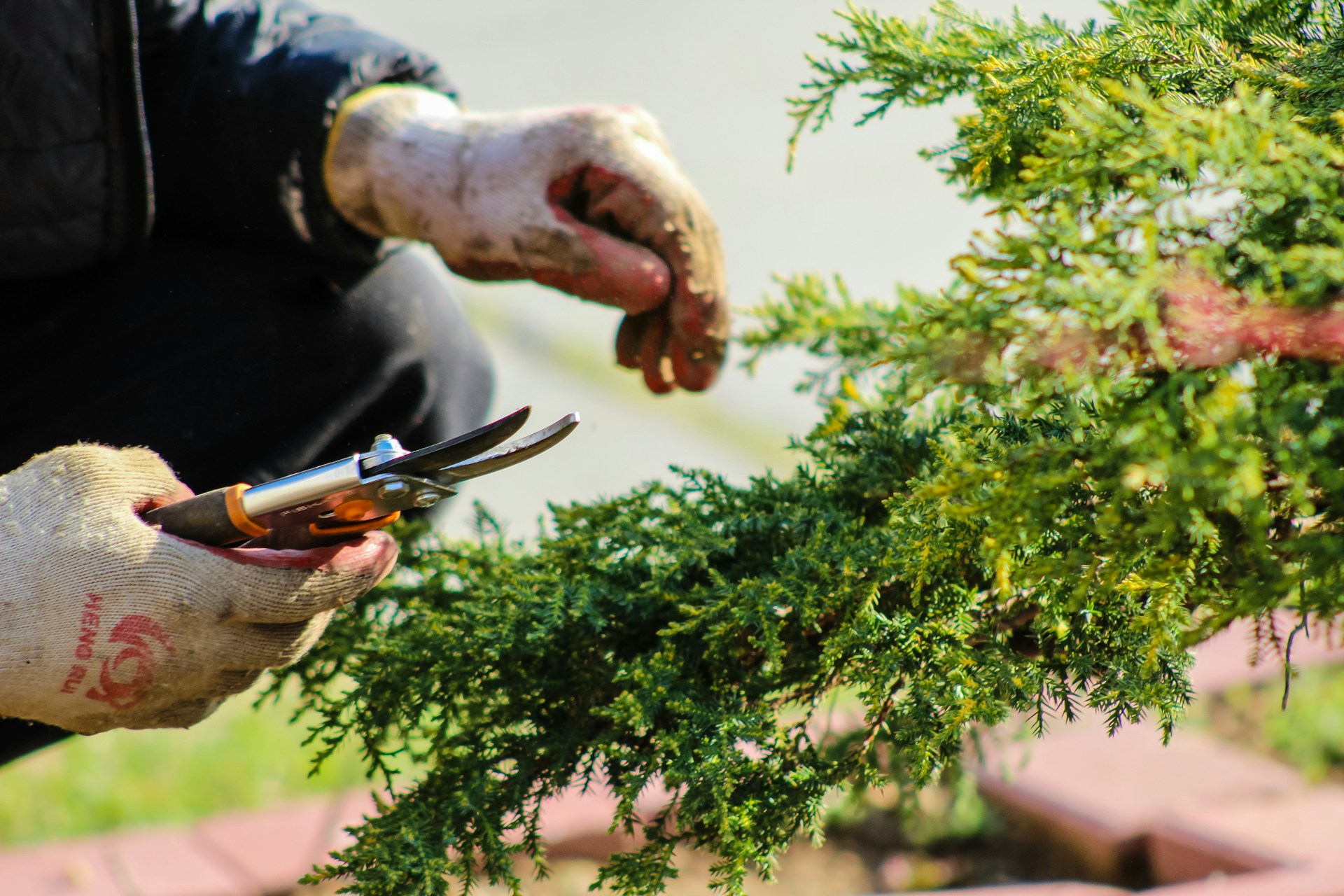
DIY Clearance Considerations
Cost Control Opportunities
DIY waste disposal provides complete cost control and allows homeowners to utilize municipal green waste collection services, community composting programs, or personal disposal facility visits that may reduce overall project expenses for smaller clearance requirements.
Personal Satisfaction and Learning
Some homeowners prefer hands-on involvement in complete garden management including waste disposal, viewing comprehensive garden care as rewarding personal activity that provides satisfaction beyond simple cost savings considerations.
Limitations and Challenges
DIY clearance requires appropriate transport vehicles, physical capability for loading and unloading materials, knowledge of disposal facility locations and requirements, and time availability that many homeowners underestimate when planning garden projects.
Vehicle capacity limitations often require multiple disposal trips that consume significant time and fuel costs, potentially offsetting savings compared to professional services that complete clearance efficiently in single visits with appropriate equipment.
Choosing the Right Waste Clearance Approach
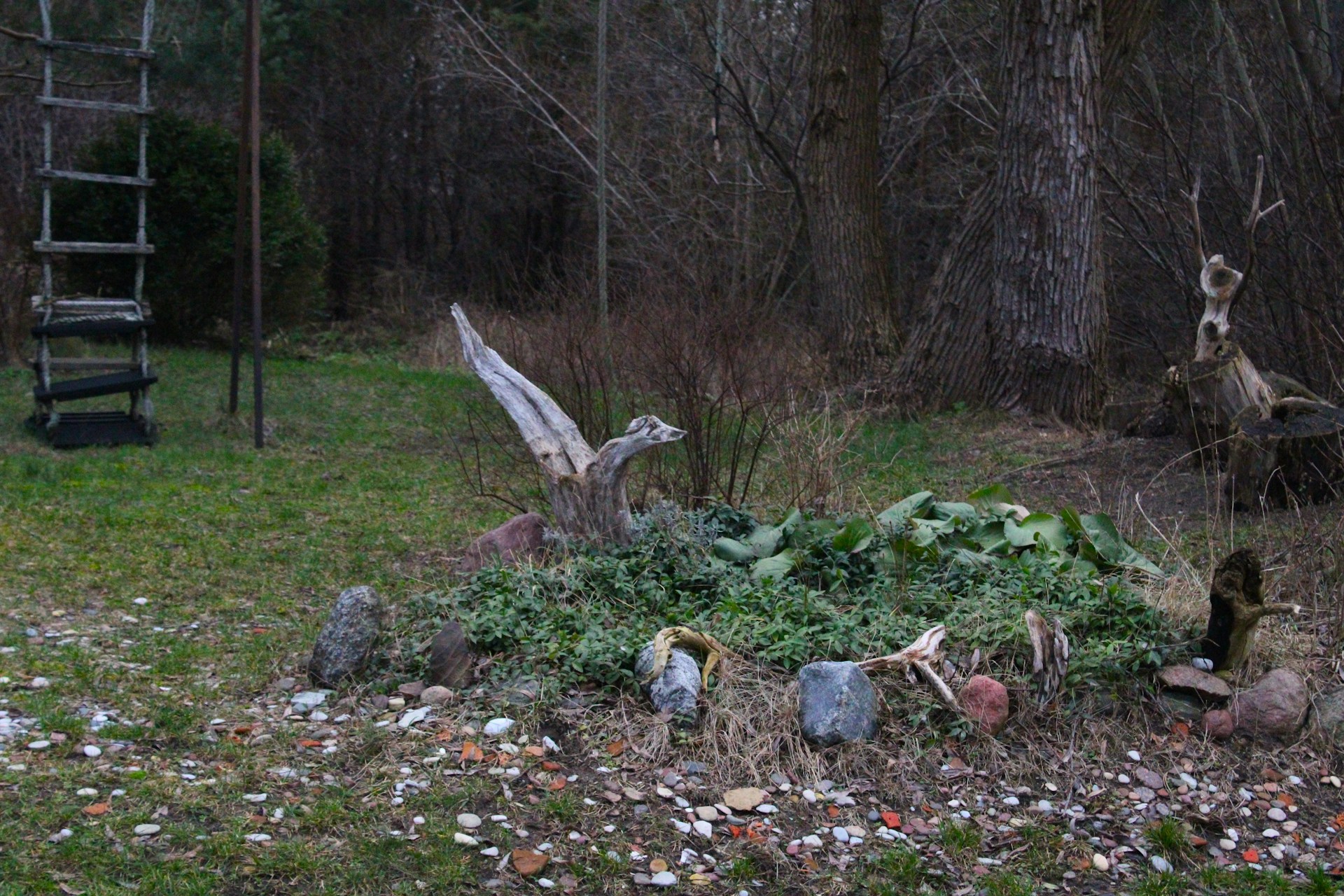
The optimal garden waste clearance approach depends on project scope, waste volume, homeowner resources, and integration requirements with overall garden maintenance planning and execution.
When Professional Services Provide Optimal Value
Large Volume Projects
Gardens requiring extensive clearance, major renovation cleanup, or seasonal management involving significant waste volumes benefit from professional services that provide appropriate equipment, transport capacity, and disposal facility access that DIY approaches cannot match cost-effectively.
Time-Constrained Situations
Homeowners with limited time availability for multiple disposal facility visits, loading and transport activities, or coordination of waste clearance with garden maintenance schedules benefit from integrated professional services that complete projects efficiently.
Complex Waste Streams
Projects involving mixed organic and inorganic materials, specialized disposal requirements, or regulatory compliance considerations require professional expertise that ensures appropriate waste stream management and disposal facility compliance.
Successful DIY Clearance Strategies
Gradual Clearance Programs
Small-scale ongoing waste clearance through regular municipal collection services or periodic disposal facility visits provides cost-effective solutions for routine garden maintenance that doesn't generate large waste volumes requiring specialized transport or disposal arrangements.
Community Resource Utilization
Many communities provide green waste collection services, community composting programs, or disposal facility access that enables cost-effective DIY clearance for homeowners with appropriate transport and time availability for regular waste management activities.
Professional Garden Waste Clearance Solutions
Professional gardeners can absolutely clear garden waste and typically include routine organic waste disposal as part of standard service offerings. However, the scope of clearance services, pricing structure, and disposal methods vary significantly between contractors and project requirements.
Key considerations for garden waste clearance:
- Routine maintenance waste: Usually included in standard gardening service pricing
- Seasonal clearance projects: Typically cost £80-£250 additional depending on volume
- Large renovation clearance: May require specialized services costing £200-£500+
- Professional benefits: Efficiency, compliance, integrated service delivery
- DIY alternatives: Cost control but require transport, time, and facility knowledge
Most professional gardeners handle standard garden waste clearance efficiently and cost-effectively, making integrated services attractive for homeowners who value convenience, compliance, and time savings over potential DIY cost savings.
The investment in professional garden waste clearance typically represents 15-25% of total gardening project costs, providing reasonable value for eliminating coordination requirements, ensuring regulatory compliance, and completing projects efficiently without homeowner time and transport commitments.
For most garden projects, the question isn't whether gardeners can clear waste, but whether integrated professional clearance provides sufficient value compared to DIY alternatives. The answer depends on waste volume, project timeline, homeowner capabilities, and the priority placed on convenience versus cost control in garden maintenance planning.